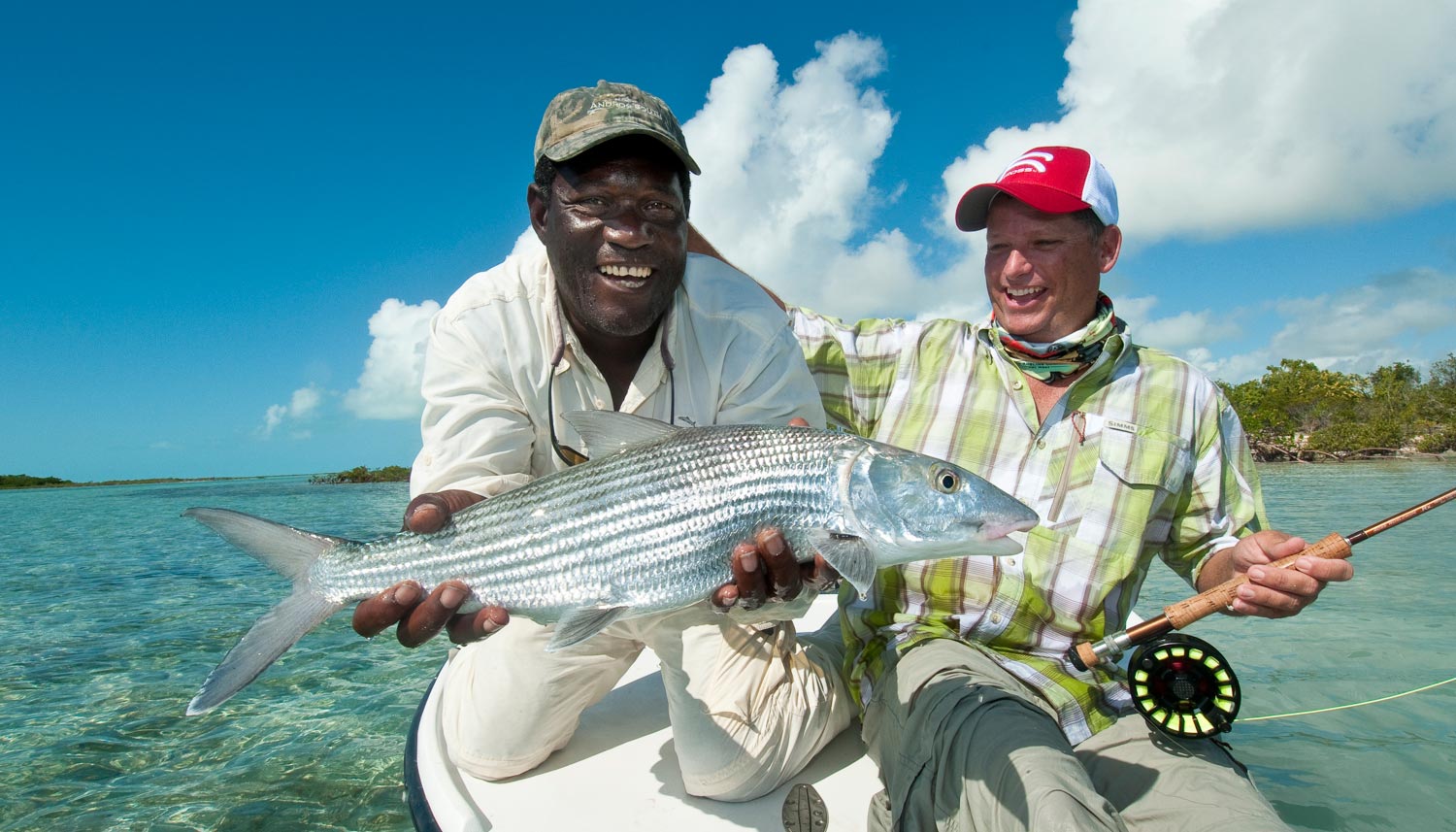By Louis Cahill
Concentration, Relaxation and Communication. I wish I could claim those words.
I’m quoting Jose Sands, bonefish guide at Andros South Bonefish Lodge. That was his answer when I asked what he thought was the key to successful bonefishing. As usual, he nailed it.
Plenty of anglers are frustrated or intimidated by bonefish. Bonefishing is a complex game with a lot of moving parts and all too often what should be a simple formula breaks down completely. When that happens it’s usually because one or more elements in Jose’s recipe are missing. It’s easier said than done but if you can accomplish these three things, the pieces start to fall into place.
Communication
Most saltwater fishing is a team sport. Whether fishing with friends or a guide, you are generally depending on someone else to help you find fish and make a good presentation. Things happen quickly and everyone needs to be on the same page and communicating efficiently to make it work.
There are some universal ideas that everyone needs to understand in order to have good communication. Understanding the bow clock, for instance. When your guide tells you there is a fish at eleven o’clock, forty feet, moving right, it should be a simple thing to find that fish. You learn pretty quickly however, that everyone’s forty feet is not the same and even your guide will occasionally lose track of where eleven o’clock is.
It pays to take a minute at the start of the day to pick an object like a mangrove sprout and decide how far away it is. That helps you calibrate for the day. I find that guides often call out distances that seem much farther than I think is realistic. Not because they don’t know how far away the fish is, but because we are looking at it from very different perspectives. Mine on the bow, and there’s, from the platform at the back of the boat. It’s also worth the time it takes to look at the bow of the boat and confirm where twelve o’clock actually is before you waste a lot of time looking for fish in the wrong spot.
Guides will also use terms like “drop the fly” and “shoot the fly,” to indicate how it should be presented. Drop means you are already carrying enough line for a good presentation, while shoot indicates that you need to let some line go on your delivery. These kinds of directions vary from guide to guide, so take the time to ask early on. It’s impossible to over emphasize the importance of good communication.
I have about a 40% hearing loss and it’s a huge challenge for me. I remind my guide several times during the start of the day that I am deaf as a post. No guide likes to shout in the presence of bonefish but if I can’t hear their direction we both wind up frustrated.
Concentration
The thing I enjoy the most about bonefishing is the same thing that makes it so difficult. It’s a game of strategy with a lot of variables. The wind, light, tide and movement of both the fish and boat play huge rolls in the formulation of a good shot, as do many other variables. You have to stay focused and make good decisions for everything to work in your favor.
It’s easy to get caught day dreaming on the bow and not have all of the information you need when the fish shows itself. You should keep a constant awareness of things like current speed and movement, light direction and wind. You need to stay aware of what your leash is doing and if your stripping line is clear.
Most of all, you have to read the actions of the fish. You need to know if he is traveling or meandering. Is he in a spot where he is likely to be on high alert or more comfortable? Does he need a long lead or should you drop the fly beside him? His mannerisms will tell you everything you need to know but you have to be observant.
Good casting takes focus too. You almost always have wind to think about, and when you don’t, a soft presentation is a must. You need to be confident in the mechanics of your cast and focused on loop control and accuracy. Mental focus pays off big.
Relaxation
I’ve saved the best for last. Relaxation may be the most important of the three because without it, the other two are not possible. When I think back over the shots I’ve blown, or seen blown, the most common cause is the angler losing focus because of stress.
This is most often a result of buck fever. Anglers who are not 100% confident will experience brain lock in the presence of bonefish. Even confident anglers can freeze up when the fish in question edges over the ten pound mark.
A deep breath is time well spent on the bow. Remember, it’s only a fish. It may be an incredibly challenging fish but it is still way down the food chain from most of us. With a little focus you can get the better of it. No one catches every bonefish they see. When you blow a shot, put it behind you. Don’t carry that frustration over to the next shot.
I’ve seen anglers completely melt down on the bow. When the cumulative frustration of multiple missed opportunities starts to get to you, take some time out. Let your buddy fish a while and get your head straight. Most of all be honest with yourself. Most of us are neither as good or as bad an angler as we tell ourselves at any given time. We are all imperfect and in a constant state of learning.
It’s very common for anglers to stress about what other anglers think of their performance. That is the most common cause of the angler melt down. Let me tell you, it doesn’t matter. How well you fish is of no concern to anyone but yourself. If you are fishing with an angler who is much more advanced than you, remember he was once where you are. He knows better than you how every missed shot stings. Don’t sweat it. Just relax and enjoy yourself. There really is no other point.


Pingback: Concentration, Relaxation and Communication Equal Better Bonefishing | Latest Fishing Blogs Posts
I don’t think I would enjoy a day of fishing under such conditions. I’m out there to enjoy myself, enjoy the experience, maybe catch a few fish, or maybe not. If I have to think about it too much, then I’m not going to have fun. Sounds to me like this is taking it way too seriously. I don’t think being under pressure for a whole day is enjoyment. And it’s certainly not relaxing.
Just my take on it after reading many such articles. I will probably never go bonefishing, unless I go alone. But again, from everything I’ve read, I probably won’t catch any fish alone and un-guided. Oh well.
Exactly, Keith. I was just thinking the same thing. If I had not been bone fishing a few times, and didn’t know any different, I would have come away with the same impressions you are expressing. When, in truth, it’s just fishing. Mr. Cahill is not wrong with regard to anything he’s telling us, but somehow, the tone of it is off-putting. I’d bet anything he didn’t intend for it to be like that.
Louis,
You nailed it! Great explanation of the ‘ying and yang’ of concentration vs relaxation. Tough to master but the journey is what counts not the destination.
I have begun to enjoy my fly fishing more after focussing more on process (eg. Learning, improving skills) than results (how many I caught vs others).
Simon.
I’ve only been bonefishing once, but that will be changing soon since I’m going on the South Andros trip Louis is organizing for June. I have however done a lot of salt water fly fishing the past three years since retiring and moving to Florida. When friends who have fly fished for trout or bass come to visit I like to prep them by explaining that saltwater fly fishing is to trout fishing what kick boxing is to hopscotch. Maybe that’s too dramatic but I think it helps to understand the different mind set. Like kickboxing, there are consequences when you have a lapse of concentration.
I like that!
I had a tough time on my last Bahamas bonefishing trip, my 8th! I blew a lot of shots, couldn’t see a fish 30 feet that the guide pointed out but saw fish at 100 and 300 yards even before the guide. I had the wrong kind of concentration. I blew shot after shot but managed to fool 6 fish in a week (5 guided, one DIY). Another good angler only caught 10 so I don’t feel it was poor fishing skills. The beginners caught 30 each! It was humbling not because I was outfished (they managed to find more big schools) but my short game was not! Since then, I’ve been focusing on remembering the fun I had, that I wouldn’t want to be any other place (except a trout stream), and know that I’ll have hard trips from time to time. I’ll think about your tips for next year and I think they will come in handy. I also remember one pod I blew up with one false cast! Back to the lawn for more practice, and then a few moments to meditate!